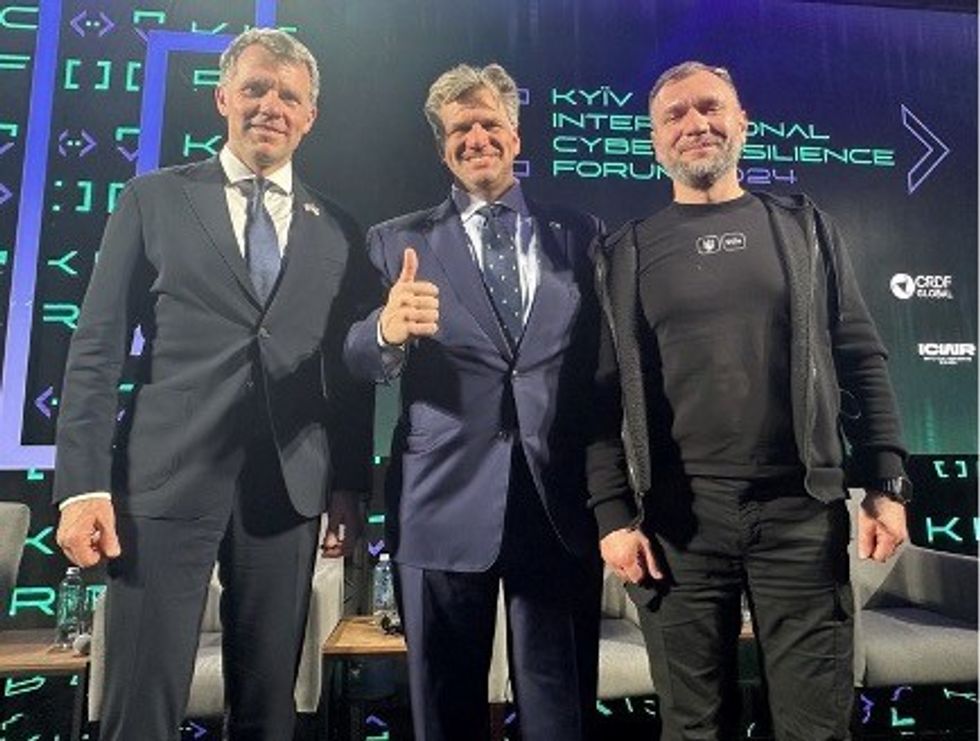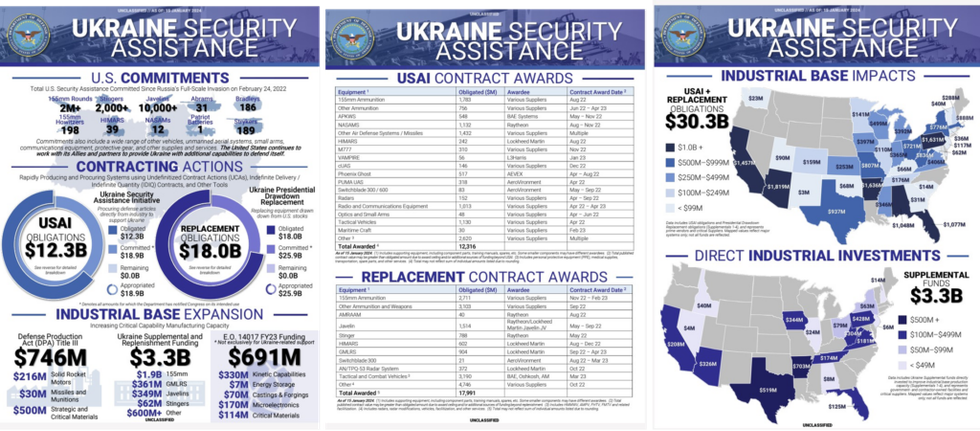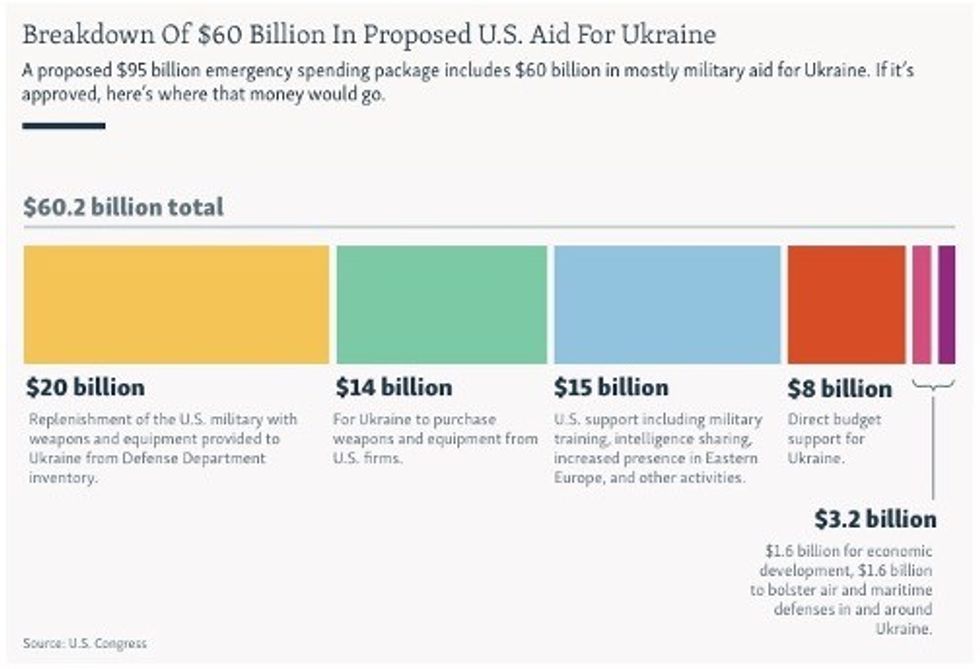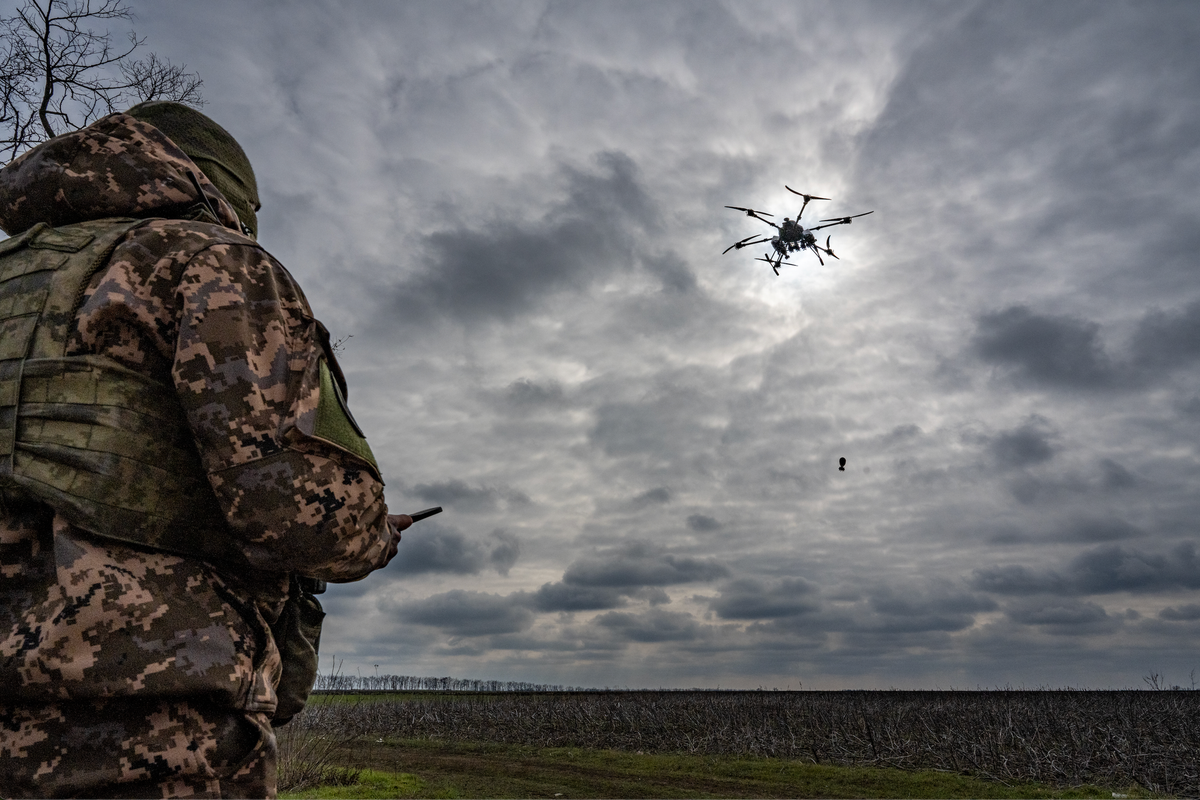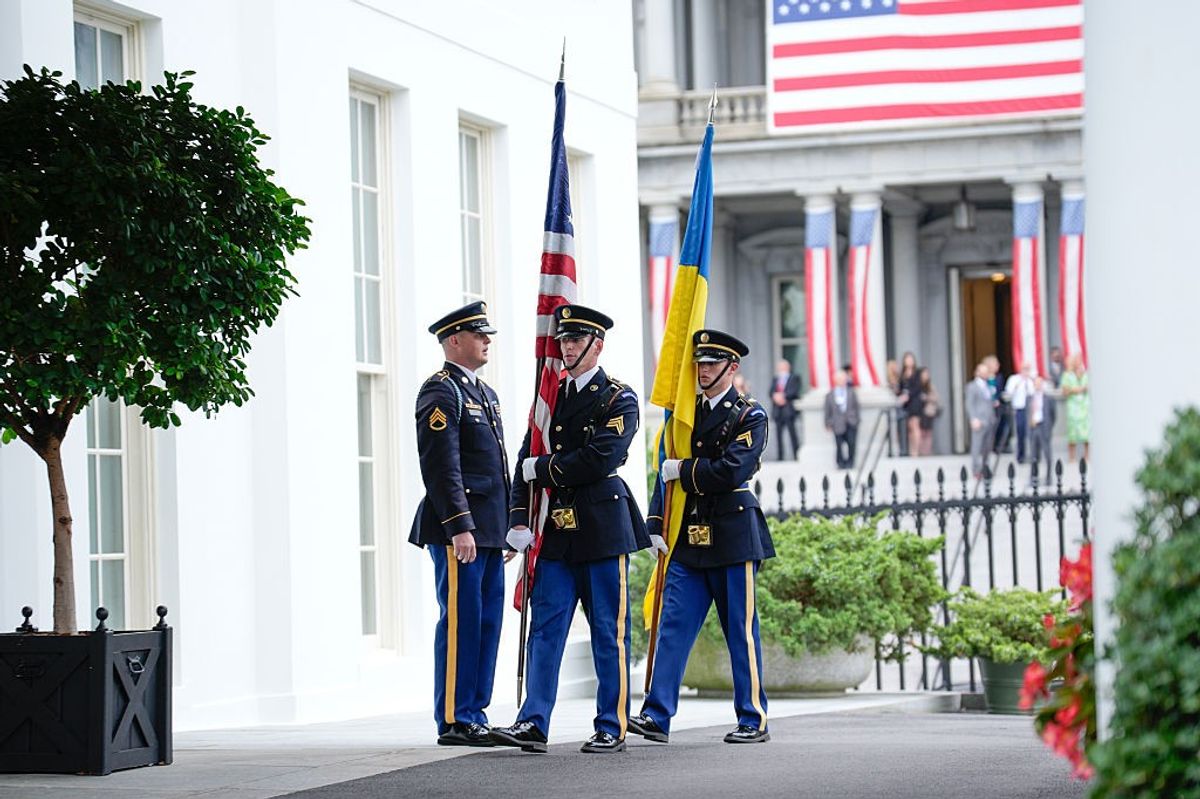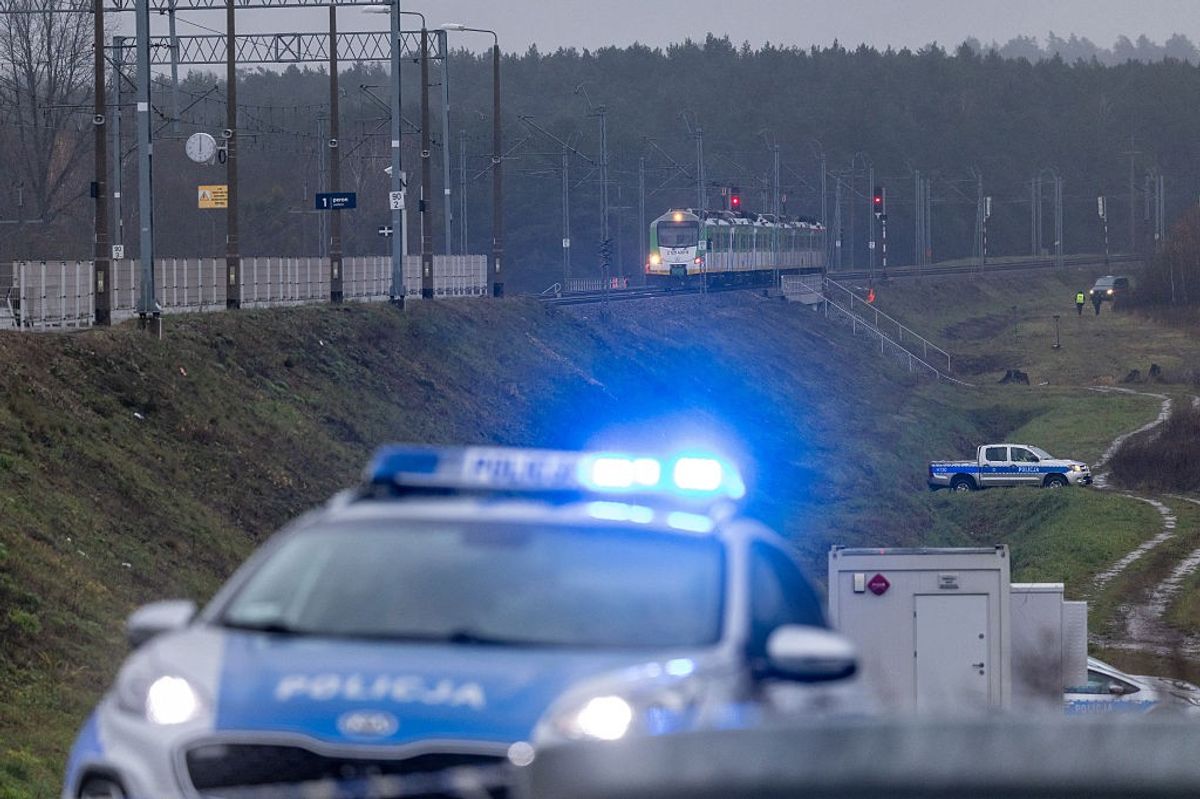OPINION - A First-Person Perspective
I woke to air raid sirens and a hypersonic boom in my room at the Kyiv Intercontinental Hotel in the early dawn of February 7, as I prepared my speech for a significant international cyber resilience forum attended by both a U.S. ambassador and an agency director from the Department of Homeland Security.
That window-rattling and building-shaking explosion, potentially involving Russian Zircon missiles against civilians, was a jarring experience, bringing the war’s realities into stark focus for me – but it marked just the latest in a long string of Russian attacks on western Ukrainian cities, commercial centers, and civilians in Ukraine who despite the deaths and dozens of injuries climbed out of shelters and immediately got back to the work of living. By 9am, the city was buzzing with life again and the most common excuse for tardiness at the cyber forum was the impact on power supply which had caused major traffic disruptions.
Photo L to R: Amb. Nathaniel Fick, U.S. Ambassador at Large for Cyberspace and Digital Policy; Andrew Borene, (author); and George Dubinsky, Deputy Minister of Digital Transformation of Ukraine on February 7, 2024. Source: Kyiv International Cyber Resilience Forum 2024
The Global Stakes in Ukraine
The situation in Ukraine is unlike any recent conflict the United States or its allies has faced. It is not comparable to Iraq, to Afghanistan, or even to Vietnam or Korea. The indiscriminate attacks on Ukraine’s civilians and commercial centers far from trench lines echo historical assaults on Western Europe in two industrial-age world wars, particularly the Blitz in London.
Russia’s war on Ukraine represents a different kind of information-age warfare combining such indiscriminate violence with aggressive misinformation campaigns and synchronized cyber attacks on societies – as Putin, the Russian Army general staff, and their various criminal proxies all wage a full-scale military invasion and nihilistic hybrid warfare campaign to obliterate Ukrainian identity,
Supporting Ukraine’s fight is more than a simple moral choice; it is a strategic imperative to reduce risk to global security and prosperity.
As we observe the second anniversary of the Russian invasion, it is clear that this conflict’s implications extend well beyond Eastern Europe. The war challenges the international order and democratic principles upheld by the United States and its allies. U.S. support for Ukraine transcends regional politics; it is fundamental to maintaining global democratic values.
It's not just for the President anymore. Are you getting your daily national security briefing? Subscriber+Members have exclusive access to the Open Source Collection Daily Brief, keeping you up to date on global events impacting national security. It pays to be a Subscriber+Member.
A New Age of War
As a combat veteran of the 2003 invasion of Iraq and a participant in various American national security efforts, I have witnessed first-hand the brutality of war. However, the “hybrid war” waged against Ukraine by Russia presents a chillingly unique scenario in the more than twenty years of my global security experience since the attacks of 9/11.
Context is simply essential for Americans to understand the severity of the situation. It's as if missiles were striking affluent American suburbs or Russian soldiers were marching through our midwestern cities. It is eerily more like the fictional “Red Dawn” film of Gen-X youth in the 1980s, and unlike the historically-based “Generation Kill” aligned with my own experience.
Having visited Ukraine twice in the past 6 months, I've engaged directly with senior Ukrainian officials in Kyiv and business leaders in Lviv to support their commercial growth and competitive business practices in the technology sector on crucial matters like cybersecurity and civilian protection. During my last week, I observed Bucha and other scenes of previous alleged Russian atrocities in heavy fighting. All of which offered me firsthand insights into both the hybrid war's devastating impact and the surprising resolve and performance of the Ukrainian nation’s civil society and its government.
Such interactions, including my latest visit to a cyber resilience forum attended by U.S. Ambassador Nate Fick and CISA Director Jen Easterly from the Department of Homeland Security, have provided me with insights into the war’s devastating impact and observation of the Ukrainian people’s unmitigated resilience and ability to keep an open western technology economy in the face of barbarity.
Geopolitical Implications and Global Response
Russia's actions in Ukraine, according to the U.S. Department of State, “are not random or spontaneous; they are part of the Kremlin’s widespread and systematic attack against Ukraine’s civilian population.” These brutalities simply mirror others in Chechnya and Georgia, providing stark warnings of future aggression in Europe and far beyond.
Russia's expansionist aims threaten global stability by setting a precedent that inspires similar actions by other revisionist regimes. Communists in China with eyes on Taiwan, and Iranian theocrats with terrorist proxies throughout the Middle East, closely monitor every allied response. North Korean generals and Venezuelan anti-democratic politicos also watch closely and consider if the West is weakening. In the threat intelligence and risk advisory business it is becoming a consensus that 2024 is shaping up to be fraught with more geopolitical risk and more regional conflagrations of interstate violence.
As such,the battle in Ukraine is not only Ukraine's; it is a global vanguard in a fight for freedom and national sovereignty. The brutality of the Russian invasion, characterized by attacks on civilians and kidnapping, even the forced relocation and indoctrination of Ukrainian children, echoes horrors of the past. The human rights violations that have plagued this war challenge basic principles of freedom and dignity, demanding a firm response from the free world. This is not just a military conflict but a fight for the fundamental rights and dignity of people and families.
The recent death of Alexei Navalny in prison exemplifies this stark contrast in values between Russia and the free world. Russia's oppressive regime, marked by the suppression of business rivals, journalists, and political opponents, poses a significant threat to global economic stability and safety for investors and travelers.
Have a perspective to share based on your experience in the national security field? Send it to Editor@thecipherbrief.com for publication consideration.
A World of Support
Backing Ukraine in its fight for sovereignty and freedom, is a wholly international effort through the Ukraine Defense Security Group which now includes 50 free world allies and security partner nations that contribute to Ukraine's defense. U.S. service members and allied forces are training Ukrainian fighters in Europe and the United States.
Europe’s continued support to Ukraine should be taken as a given based on geopolitical proximity and the sharp memories of still-living Europeans who lived under Soviet Russian Communist oppression before the advent of glasnost, perestroika, and the collapse of the failed system of satellite socialist republics.
The United States' support for Ukraine needs to be grounded in both moral and strategic considerations. It is crucial for maintaining the international order established in the aftermath of World War II. The situation in Ukraine has wider implications, with other countries seeking to destroy the post-1947 world order – authoritarian regimes in China, Iran, North Korea, and Venezuela – each observing the global responses (or nonresponses) to every Russian action.
China’s position on the outcome in Ukraine for Russia, and its own near-term ambitions for territorial dominance, are closely linked. Iran’s increasingly aggressive regional use of military proxies, that began with Hamas terrorism but now spans the Middle East and is impacting billions of dollars in global trade on the Red Sea, is not a coincidence in timing. North Korea’s own rhetorical escalations, missile launches, and military activities seem correlated to escalation whenever they perceive American and allied force dilution away from the Pacific.
The U.S. Commitment to Ukrainian Defense
Misinterpretations of the financial aspects of support to Ukraine obscure its true purpose and value.
Financial aspects of bipartisan Congressional support for Ukraine are often misconstrued. The billions in aid primarily strengthen the U.S. economy through manufacturing jobs that strengthen the U.S. military with new hardware, while a portion aids Ukraine through the transfer of aging assets.
While aiding Ukraine, a significant portion of the allocated funds is intended to strengthen the U.S. economy and military. This investment aligns with America’s strategic interests and bolsters both national and international security.
Source: https://www.defense.gov/Spotlights/Support-for-Ukraine/
According to the Congressional Research Service (CRS), a nonpartisan shared civil service staff to congressional committees and Members of Congress, the United States has provided roughly $47 billion in security assistance since 2014 to support “Ukraine’s efforts to defend itself against Russia’s aggression, secure its borders, and improve interoperability with NATO.”
Thus far, U.S. support to Ukraine, has covered everything from defensive hardware like air defense capabilities and ambulances, to software and training, and also delivering the hard kinetic power needed by Ukrainians on the front lines with Javelins, HIMARS, long-range strike missiles, tanks, artillery shells, and more.
The U.S. Senate's recent bipartisan decision to reinforce our own military stockpile can arguably be viewed as a $60 billion strategic move against global authoritarianism and toward rebuilding American defense capacity to relative levels needed, but not seen since Presidents Reagan and H.W. Bush recognized a need for readiness to fight and win simultaneous major theater wars in both hemispheres. That funding package reflects America's historical role in supporting those who confront oppressive regimes in their own lands, and is crucial in the current context to support Ukraine in its struggle against Putin’s expansionist ambitions.
Graphic: from Radio Free Europe
Reflecting on America’s reluctance in 2014 to provide substantial aid to Ukraine, we can see the consequences of inaction by U.S. and European partners – significant territorial losses to Putin’s forces immediately ensued, including Crimea and Donbas. This underscores the need for a proactive stance in global affairs to counter aggressive expansionism by Russia today and possibly by other nations in the future.
U.S. support, complemented by European allies, is indispensable to the Ukrainian military which is reliant upon external sources of ammunition, hardware, and systems. Development aid, particularly through USAID, has been instrumental in strengthening Ukraine’s defense capabilities and priming their unmatched cybersecurity, innovation, and engineering sectors for extensive growth once peace is achieved.
Additionally, the U.S. and European capital markets stand to gain significantly as NASDAQ assistance aids Ukraine’s endemic technology economy in establishing an International Finance Center.
However, uninterrupted support is essential to maintain this momentum.
Find out how private sector businesses are investing and innovating in Ukraine at The Cipher Brief’s Kyiv Economic and Security Forum. Find out more at TCBKyivForum.com
Private sector support for Ukraine includes building long-term economic interests and expanding European and American free market values. NASDAQ, as a global leader and the major technology company exchange, is assisting Ukrainian public companies in combating corruption, promoting entrepreneurship among Ukrainians through workshops and training on governance, and advancing transparent capital formation for Ukrainian companies with pathways to listing on NASDAQ’s U.S. and European markets. That investment in capacity building speaks volumes to the upside in Ukraine’s security as a self-determined, independent state.
Joint Values and Resilience
Supporting Ukraine is more than just a response to Russian aggression; it's about affirming a commitment to democratic principles and human rights on a global scale. Standing with Ukraine means defending the values that define a free and secure world.
Fighting Putin’s attempts to undermine our shared values is critical, or the erosion of those free world post-Enlightenment values will keep expanding. Support for Ukraine is a testament to global democracy, human rights, and the international order established post-World War II.
By standing with Ukraine, we defend not just a nation but the very Western Enlightenment principles that underpin a free and secure world. Our resolve must not waver. The future of inviolable individual human rights, global democratic sovereignty, and modern rule of law hangs in the balance.
As this conflict continues, the United States' and allied commitment to shared values remains crucial. The outcome of Ukraine will have lasting implications for the international order and the preservation of freedom and sovereignty worldwide.
The Cipher Brief is committed to publishing a range of perspectives on national security issues submitted by deeply experienced national security professionals. Opinions expressed are those of the author and do not represent the views or opinions of The Cipher Brief.
Have a perspective to share based on your experience in the national security field? Send it to Editor@thecipherbrief.com for publication consideration.
Read more expert-driven national security insights, perspective and analysis in The Cipher Brief




